Basically I am just looking for an equivalent of this sql statement:
SELECT * FROM products GROUP BY merchant_id ORDER BY id DESC LIMIT 10;
This works fine when ONLY_FULL_GROUP_BY is disabled, but when its enabled, it doesn't work. What is the equivalent sql statement for the above to make it work on the ONLY_FULL_GROUP_BY mode?
What I am trying to do is lets say I have 100 products with ids 1 to 100 that are distributed among 10 merchants. So I want to list out the latest 10 products, 1 from each merchant.
EDIT
Here is a sample table and expected output. (assume merchant 1, merchant 2 etc is the secondary key column for merchnat_id) So as you can see, what i need is one product(the one with the highest primary key ie the latest for that merchant) from each unique merchant.
